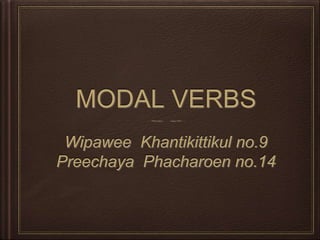Modal verbs provide additional meaning to the main verbs in a sentence, such as certainty, possibility and ability. There are single concept modal verbs that have one meaning and double concept modal verbs that have two meanings depending on context. Modal verbs do not have infinitives, "-ing" forms or all tenses. Their meanings can also change in questions and negatives. Common modal verbs discussed are can, could, may, might, will, would, shall, should, must and have to.






















